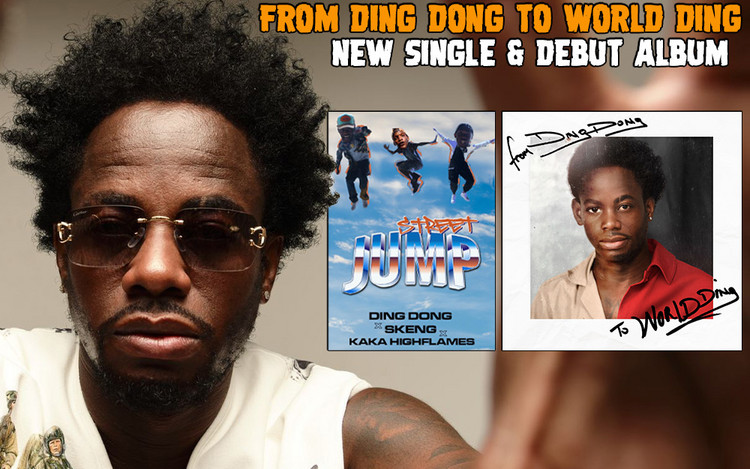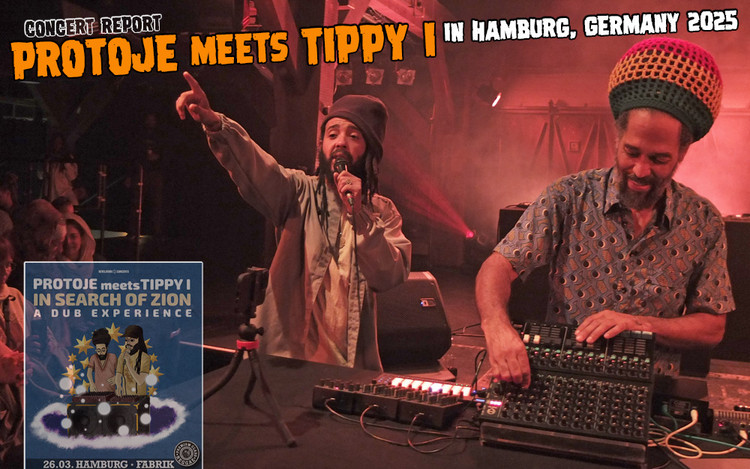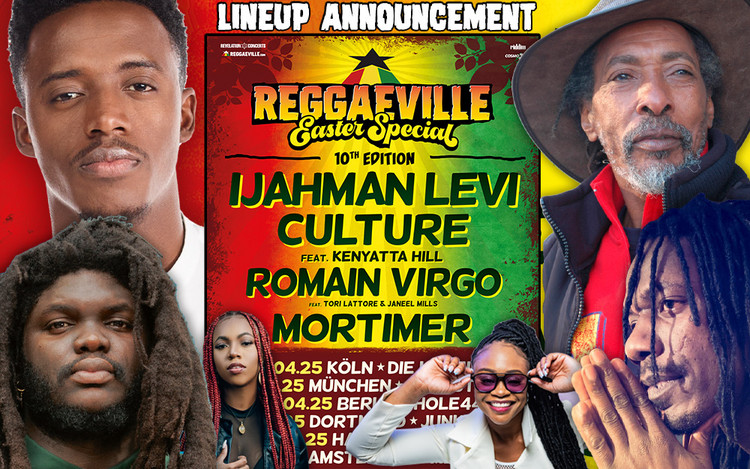Macka B ADD
Interview: Macka B - Reggae Daddy
04/20/2012 by Angus Taylor
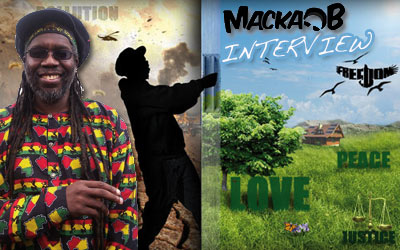
Macka B (born Christopher McFarlane in Wolverhampton, England) is one of the UK’s hardest working, most widely travelled and outspoken MCs. His career began in the early 80s when his toasting on Birmingham’s Wassifa sound led to a single “Bible Reader” for London’s Fashion Records. In 1986 he underook a fruitful series of collaborations with the Mad Professor commencing with his debut longplayer Sign of the Times. Since then he has issued some twenty albums, including three recordings of his distinctive live shows, which feature careful and often humorous explanations of his chosen topics from a Rastafarian perspective. The veteran chanter just kicked off his 12 date tour of Germany in Freiburg (April 19th) in preparation for his new album Change The World, produced by himself with guest rhythms from Ironfirst productions and the sweet Studio 1 rocksteady and early reggae revivals of Peckings. Over these the man of a thousand opinions holds forth on everything from gang violence to slavery reparations to musicians who "sell out". Macka B can be an imposing presence to interview due to the depth of his voice and convictions but on this occasion there were smiles and laughter as Reggaeville entered into a lengthy discussion of his album and his views on the current events that could well populate his next... You have a new album Change The World due out in June, but it will be available as a limited edition on your German tour. You're huge in Germany aren't you? I've seen you billed on festivals above visiting Jamaican artists.
You have a new album Change The World due out in June, but it will be available as a limited edition on your German tour. You're huge in Germany aren't you? I've seen you billed on festivals above visiting Jamaican artists.
I've been going there since the late 80s and you could we kind of started a little revolution and got the Germans jumping to reggae. If you ask a lot of Germans of a certain age what was the first live reggae show they went to a lot of them will say "Macka B".
Tell me about the concept of your album Change The World.
We see how the world is running and it's not really a fair world. The rich are getting richer; the poor are getting poorer, too much injustice, too many wars, not enough peace love and unity. Really I'm trying to tell the people that we have it in our power to really change things. First you have to change yourself, obviously, so you've got to occupy your mind and get rid of all the brainwashing, but once we get together and unity is strength we get to realize that people have the real power. Realizing that you have the power is the first step, and a lot of things the powers that be do are to stop you from realizing that you really have the power. You can only be controlled if you want to be controlled. If you realize that you are a spiritual being having a human existence then nothing can really control you, the boundaries are limitless, and if we really get together we can really change the world.
Let's talk about some of the collaborations you've got on this album. You did a track No Thank You on Lloyd's last but one album Cornerstone and now he's come back and done the track Enemies on yours.
It's a pleasure to work with Lloyd because he's one of the great singers out of the UK. Underrated as well because he's a really good songwriter and singer. He's like the Beres Hammond of the UK - he's got those kinds of vibes - and if he was in Jamaica he'd be a household name all over the world - and he's big in a lot of places. He's a conscious person and he's got good lyrics and I respect his music.
Lloyd recently celebrated 30 years in the business. Do you celebrate landmarks or do you just keep on working?
Yeah man, I just go on still! (laughs) Because it's been over 30 you know! But we just go on because as I say we're limitless and we're spiritual beings so we don't age. We just carry on ‘til Jah says.
As well as Lloyd you also collaborate with David Hinds and Luciano. These are all people who do their own thing in the industry despite what the latest trends might be. Is that why you like to work with them?
Yeah man, because they are conscious. A lot of people are in the music to be stars and are thinking "What's the latest hit? What can I do to make people buy my records?" But there are some - and I put myself, David Hinds and Luciano in that category as well - who are messengers. Stardom is the least thing on our minds when we are making a tune. We don't say what people want to hear all the time. Sometimes you've got to say what needs to be said and then the people will hear what you're saying and then reflect upon it. A lot of times you only hear one side of the story so you have to hear the other side and open your mind so you can make a proper choice. We are singing Jah works and we realize that this music and this talent Jah has given us must be used for good. It's not about the bling bling - it's about raising awareness in people's minds and hopefully making them better people. On the track Can't Sleep you address this topic directly, while actually putting Autotune or some other effect on your voice to create the sound of an R&B crossover tune while talking about the artists who take the easy path?
On the track Can't Sleep you address this topic directly, while actually putting Autotune or some other effect on your voice to create the sound of an R&B crossover tune while talking about the artists who take the easy path?
Exactly. That's very perceptive. That is exactly why I did that. Because if you notice I never did that on a tune before and maybe I won't do it again! (laughs) If you really check the way I do my thing everything – every line, every concept - is really well thought about. So it's not just head top lyrics and a chorus and a punchline. It's a concept and when you hear the tune Can't Sleep it's about where the music industry is going and the people who are leading people astray.
I'm not asking you to name names but given that you mention the use of occult symbols in videos was this song inspired by any artists in particular?
It's a general thing but obviously there are some who seem to promote all the things I am talking about while selling their souls. As I say in the tune it's become a kind of fashion thing to use all these signs and symbols where some people who are doing it don't even know what they mean but they are copying others doing it, giving power to these things. So this is something that we really have to address and make people open their eyes and see what's really going on.
Another tune that looks at the music industry from another angle is the tune Reggae Daddy which talks about the influence of reggae on jungle, garage, funky and dubstep and even replicates the beats mid song to make your point. You yourself worked with Fashion Records in the 80s who would later put out jungle tunes themselves.
Yes because as we know, when the jungle first came in it had lots of reggae samples and reggae deejaying over it and that's what made it really popular. All of these other musics were really emanating from jungle - the drum'n'bass and garage. But the reason I made the tune is because dubstep now is the in UK thing where you even see adverts for dubstep albums on the TV, so it's become very popular and mainstream. But for some reason reggae is held back. It's not as mainstream as it could be. Even on the main radio stations there's no reggae programming. When you go to other places in the world reggae is on mainstream radio and it is a big thing. Whereas here which was kind of the home of reggae in Jamaica in the 70s and the 80s, people really like reggae here but it's not being pushed towards them. They're pushing the dubstep, the R&B and the hip hop but they don't realize the reggae music is there and it's a big music all over the world. It's a people's music. It's a message music. So maybe they don't want another Bob Marley? Everybody loves Bob Marley but that's how it goes.
But at the same time reggae in the UK on a live level has grown since the last time you told me this. There are many reggae festivals in the UK, and kids queue up outside trendy bars in London to hear reggae and dancehall.
Yeah man, it has to be because people listen to all the dubstep and jungle and hear the collabs with it they have to go and hear the original thing that gives it that vibration. And once they discover it they like it just as much as the new stuff and some of them like it more. As you say there are festivals springing up in England now when for a long time there were none and we give thanks for that. The only thing is that with some of the festivals they don't want to go for full reggae whereas in Germany and France you have festivals with just full reggae. They need to draw in the people here with hip hop and whatever. So it's all good but we want to have a time where they have confidence in reggae because I really think that just the reggae alone can really draw the people. But we give thanks for all the festivals and this new music is making people realize the greatness of reggae so it's all good.
Let's talk about your festival appearances. You perform all over the world and often you are interacting with young kids who are having their first festival experiences. They might be drunk or high and they are running around having the time of their lives and then they encounter you and your band and through the music and the message you change their whole way of thinking. So you are kind of on the front line of changing people's consciousness at festivals.
(laughs) Definitely and it's all good because it's all about communication. Even people whose first language isn't English often say "Macka B, I can understand your lyrics" because I keep it as simple as possible so the whole world can overstand. As you say a lot of young people come there and it may be their first festival. Everything is a vibration - music is a vibration, speech is a vibration so we just try to connect with the vibration of the people and I always try to explain a little bit about the lyrics before I do it.
As you say sometimes people can be drunk but I have a song called Don't Drink Too Much and when they hear this song they start jumping and cheering but it's making them think as well. From the start I put a little humour inside a lot of the lyrics because it kind of breaks down people's resistance. Whereas if you go all out all the time people can put up a wall. Sometimes there is no humour and you have to be straight but sometimes it's good to put in a little humour and see the people's faces light up and start smiling and get into the vibration. As we say we are all messengers so we have to do the works. You can't sit down on the fence: either you're part of the problem or part of the solution; I try to be part of the solution.
The message is a big part of the music but there are other aspects to the live performance as well. For example, in recent years you have been touring with a horn section. You rose in the digital era when people didn't do that so much but now the horns are an integral part of the impact of your live sound.
Yeah man. I love the horns and the players of instruments. As you say, the sound, that real authentic sound. Sometimes the keyboards are alright but it doesn't have the real feel and the full one hundred so people like to hear it and to see it. And for the tour of Germany we are going to have the full horn section and on the new album we have the horns and a lot of the music is live. You have to keep that reggae sound. Because if you listen to a lot of other genres of music they keep their sound. Blues and jazz, they keep their sound. So I don't know why reggae doesn't want to keep its sound. If you listen to rock and roll, they keep their sound but another generation comes into it and they just talk about their experiences but they keep their sound. So we cannot lose that sound because it is really powerful.
One way that that sound is being brought back to a new audience is on the rhythms of Peckings, which feature alongside your own on the album. It must go without saying that you are a fan of Studio 1 and Treasure Isle but it must be nice for your fans to hear you on those rhythms.
Yeah man, it's a pleasure to be on those because as you know I come from sound system and that was the kind of music we used to play. So when I got the chance I jumped at it and we give thanks for Peckings giving we that chance. When the people hear a tune like Never Played A 45 when we do it live they just love it as the music starts! Obviously I explain it beforehand and I always have a 45 with me just to show the people what I am really talking about! The first thing I do is show them and ask them "What's this?" and some people look confused so I explain it to them (laughs). When I was in Gambia I said to the people "Macka B don't talk no gun talk nor badness but I have a 45" and people started thinking "What's he talking about? He has a gun!" So I said "Do you want to see my 45?" and some people said "No, Macka, no!" but then I turned around and got the 7 inch 45 and pulled it out everybody started cheering so it's all good!
I'm going to ask you some more about Gambia in a minute but on the song Make A Claim you use the metaphor of no win no fee personal injury lawyers to make a point about slavery reparations. But what do you think of the compensation culture and how it fits into the system?
To be honest if you're talking about PPI claims and those things the banks have been ripping off people for years and I call it Legal Thief innit? They've been getting away with those things for years so it's good that the people can get back a little bit. With personal injury some people abuse the system which makes all insurance go up and it can never be perfect but that's how it goes. In America it's worse! If you step on a man's toe he's suing you!
Do you think compensation for colonial slavery will ever be paid?
I don't know, got to apologize first! But it's not the people who've got to pay, it's the governments and all those businesses who made so much out of it. I don't know if they will but it's something that needs to be discussed because a lot of people get reparations for a lot of things. I'm not saying it's definitely going to happen but it should happen in some form because we have the law and when you've been wronged the law says you should be compensated so we're just going by the law. They make the law, they should abide by the law, simple as really.
Going back to the song Reggae Daddy, do you think reggae deserves some compensation from all the music that it has sired without credit?
(laughs) Yeah man, most definitely! Put more reggae on the national radio. We have to give thanks to the pirates for keeping the reggae alive. We need more reggae on the TV because when you notice when you have reggae on an advert it becomes one of the most popular adverts. That's the power of reggae music because it has such a powerful vibration so they should give something back to reggae for all the music it has given birth to.
What do you think of these payday loans that are advertised in the UK where people can borrow £100 at an extortionate level of interest (sometimes over 4000% APR) that is actually banned in Germany and other countries in Europe?
I have seen it. I did not know it was illegal elsewhere. You see, some people are under real pressure and they need it today. And they make it so easy for them to get these things because all you need is a job and an address, so they are really using the economic situation to get to the people. In a way it's a shame because they can do it like that and not have to charge so much interest really - that just borders on greed. They know a lot of people are not going to be able to afford it back or they would not be asking for it so it becomes a vicious cycle and they get more and more in debt. Really there should be some sort of cap on the interest even if it can be useful for some people. The government should investigate it because anybody can just do it right now and make a bag of money.
On the songs Postcode War and Could Be Wrong you talk about the taking of life through gang violence and the death penalty. Are all forms of killing wrong?
To me, yes. I don't even kill flies. If there are flies or wasps in the house we've got a fly catcher and we let them outside to join the rest of their people. I am vegan of course so I don't kill animals and a lot of people who eat meat they couldn't kill an animal - they have to have somebody else do it for them. 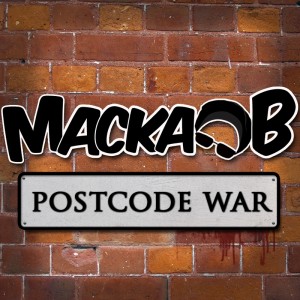 With Postcode War, most definitely, they're taking a life and they don't realize that they are pawns in a game where there's a cycle going round and round and it's getting worse and worse. The youths involved are getting younger and younger and younger and when you see some of this behaviour and some of the films that get shown on TV you realize it's bigger than just the youth them in the ghetto. You can't have these little youths being allowed to watch these gangster films with the violence. It's a crazy thing in this society which is supposed to be peaceful and loving.
With Postcode War, most definitely, they're taking a life and they don't realize that they are pawns in a game where there's a cycle going round and round and it's getting worse and worse. The youths involved are getting younger and younger and younger and when you see some of this behaviour and some of the films that get shown on TV you realize it's bigger than just the youth them in the ghetto. You can't have these little youths being allowed to watch these gangster films with the violence. It's a crazy thing in this society which is supposed to be peaceful and loving.
And You Could Be Wrong, definitely, if you're not sure. Right now the trial's going on for Breivik in Norway and he's not going to be killed when he definitely killed 77 people and he brags about it and he's like a hero to some people. But he's definitely not going to be killed yet Troy Davis was in America when so many people were saying "Hold on a minute, the evidence is a bit dodgy, it's not 100% so just wait" so I'm thinking that if you're not sure - if there's even a little bit of doubt because it says in the statutes "Beyond a reasonable doubt” - just give him a life sentence. To kill him is sending out the wrong message in a civilized society. Those kind of issues have to be addressed and I have to get them into public reasoning because people have to start reasoning again instead of following like sheeple and watching soap operas. People have to start thinking and reasoning and seeing the bigger picture again.
Have you been following the Trayvon Martin case?
Yeah man. If you kill an innocent person like that you are a murderer and you should be tried for it most definitely and then if you are found guilty you have to go to prison. You can't be above the law. I have a tune coming on Necessary Mayhem soon about a similar kind of thing where I say "If you take an innocent life you are a murderer - you could be a soldier, a vigilante, a police officer or anybody". It's not right - you can't have one law for one and one law for others. It's got to be fair across the board. If you didn't mean to do it then that's manslaughter and if it's self defence that's no offence. But if you meant to do it then that's murder - simple as that.
You already mentioned Gambia and the Mad Professor's festival. You've been to Africa before but why was this occasion special?
I've been a few times. I've been to Senegal and Gambia before, South Africa, Botswana, Sierra Leone and a few other places. This time was good because as you know I have known Mad Professor a long, long time. The Back To Africa Festival was his first festival and it was a great concept that he had and I was grateful to be a part of it. It worked out nice and the people who came appreci-loved it, the Gambian people loved what Mad Professor was doing for them, bringing so much artists from around the world and putting Gambia on the map as well. Gambia is known as the Smiling Coast because they are very friendly people and the response was great. They really love reggae music in Gambia and when you listen to the radio there it's like listening to a DJ in England because they patterned it off the pirate DJs in England and they play reggae nonstop and really make you feel welcome so it was a joy. I think we are going back there at the end of the year so we give thanks.
Finally a question about 45s. You and Earl 16 collaborate on a cover of Sylford Walker's Joe Gibbs 45 Jah Golden Pen. Sylford is an artist who never got the justice that his talent deserved at the time.
Most definitely. As you say Sylford Walker is one of the great artists - Lamb's Bread and Golden Pen are some of my favourite tunes. I always loved Golden Pen and when I was doing this album I wanted to lick it because it has a vibes - a real good vibration - and as you know Earl 16 is my brethren from long time and we've done a lot of collaborations. It just fit him perfect and suited him down to the ground. It's a song he used to listen to from when he was a youth as well going to 12 Tribes dances in Jamaica so he said he'd love to do it. Respect to Sylford Walker as it is a great song.




